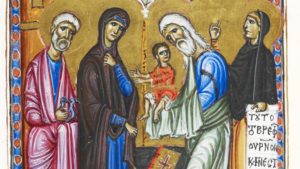Photo: Psalter of Queen Melisende/Flickr Commons
This November, as we remember our departed in a particular way, it is a good time to remember also that the church offers comfort for the men and women left behind when a beloved spouse dies. Widows and widowers have a life full of dignity, purpose and mission. As Vatican II declared, “Widowhood, accepted bravely as a continuation of the marriage vocation, should be esteemed by all.”
This esteem is clear in the reverence of the Gospel of Luke for the widow Anna, who uses her special attentiveness to the Lord and availability for his work to announce the infant Messiah’s arrival. (see Luke 2:36-38) We often think of the Blessed Virgin Mary in the dignity of her motherhood, but we sometimes forget that much of her earthly mission was lived in the dignity of her holy and fruitful widowhood.
As Our Lady knew after she lost St. Joseph, the pain of losing a beloved husband or wife must be incredible. Servant of God Catherine de Hueck Doherty, the founder of the Madonna House apostolate in Canada, wrote that each year, on the anniversary of her husband’s death, her grief was acute, and she would take it to God in prayer. And yet she lived a fruitful apostolic life even after losing him.
It was the apostolic witness of a widow that helped convert St. Edith Stein from atheism. Two fellow atheist intellectuals in her circle of university friends became Christian and married, but soon after, the young husband died. When Edith went to visit his widow, she was amazed that her faith gave her such peace and strength. This compelling experience was an important step toward her conversion.
Widows have an important place in the church. They have important work to do here, people to love and a witness to give. They have a difficult cross to bear, but a loving Savior to help them carry it.
Pope Francis encourages widows and widowers, and all those who have lost a beloved family member, not to let their grief run unchecked, knowing that Christ will restore our loved ones to us:
We have to help the grieving person to realize that, after the loss of a loved one, we still have a mission to carry out, and that it does us no good to prolong the suffering, as if it were a form of tribute. Our loved ones have no need of our suffering, nor does it flatter them that we should ruin our lives. … They can no longer be physically present to us, yet for all death’s power, “love is strong as death.” (Amoris Laetitia 255)
We know, through our faith, that we shall see our loved ones again. In the words of Peter Beaulieu, a parishioner at St. Mark Parish in Shoreline who lost his wife Kristi 16 years ago to cancer, “It’s more of a parting than a separation, and the parting is only temporary.” (Beaulieu has reflected on this in his book Kristi: So Thin is the Veil.)
Pope Francis and Mary, the hopeful widow, encourage those left behind to spend their remaining years purposefully, growing in love and prayer. As Pope Francis put it, “The better we live on this earth, the greater the happiness we will be able to share with our loved ones in heaven. The more we are able to mature and develop in this world, the more gifts will we be able to bring to the heavenly banquet.”
Originally posted on Northwest Catholic – November 2017


Thank you for reminding me of Mary’s widowhood. This isn’t something that is commonly written about but is such a reality that we need to contemplate. I am also grateful for listening to your “one minute” talk about affirming our spouses. Such good ideas! Thank you..